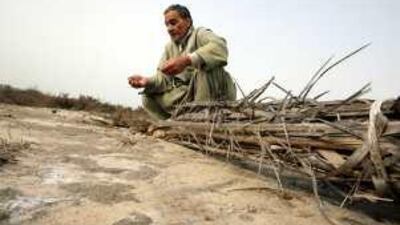CAIRO // A conference on environmental security in the Arab world opens in Alexandria today, just days after an Egyptian minister warned that his country has fallen below the water poverty line and amid a government campaign to educate citizens on the economical use of water. The conference, titled Scarce Water, Rising Water: Between Draughts and Flooding - Arab Policies to Meet Environmental Challenges, will address challenges ranging from rising sea levels to desertification, with a warning that the next regional wars will likely be over water resources.
The two-day conference will be hosted by the famed Alexandria Library (Bibliotheca Alexandrina) and based on the Arab Human Development Reports, which are written by Arab scholars and endorsed by the United Nations Development Program (UNDP). "The Arab region is facing the problem of water scarcity, but the people are still acting as if it's not an imminent problem or that its none of their business," said Ayman al Sayyad, editor of Weghat Nazar monthly, a highbrow, cultural, monthly magazine which was entrusted by the UNDP to organise the conference.
"We're hoping to raise the attention of average citizens to the gravity of the problem, and how to improve their usage of water." Al Sayyad said that while it is widely believed the next major conflicts in the region will be over water resources, little is being done to avoid that eventuality and neither the media nor the public seem to be overly concerned about it, possibly due to a lack of awareness.
"Rationalisation in using water in Egypt has become a matter of life," the minister for housing and construction development, Ahmed el Maghraby, said last week in Cairo at the launch of a workshop titled "Pure water for a healthy life". "We are deceived by the flowing of the Nile, when in reality we are a country under the water poverty line, and we have to change the culture [of believing] that water is endless. NGOs and the media have to play a role in changing that."
Al Sayed Abdel Aziz, the governor of Giza, has just started a four-month campaign, with the help of scholars from Al Azhar, artists and young social workers to help explain to people the hazards of wasting water and ways of saving it. "Changing such concepts takes time, generations maybe," said Adel Abdel Latif, chief of the UNDP's Regional Programme Division. "Global warming has affected agricultural production, which is aggravated in the Arab world by a lack of interest in the problem as well as growing populations.
"Our goal is to find ways for scientific scholars to relay their message in an easy way to the average citizen." Mr Abdel Latif said the conference would be part of a series of debates and dialogues about water with special emphasis on the shortage of water and food security. He said Arab governments are not paying serious enough attention to the problem, as the water issue has not been discussed in any Arab summits, even the economic summit in Kuwait last year.
Thousands of Egyptians suffer from serious water supply problems, which had lead to mass protests across the country in recent years, especially in the warmer months. At the conference, the keynote address, which will be given by Ismail Seragelin, director of Alexandria library, will be about climate change, food security and water challenges and opportunities in the Arab region. Climate change, water and agricultural adaptation and Arab land decertification will be addressed by different scholars.
Other talks and debates will include Coastal Zones Protection: The Alexandria case and scenarios of rise in sea level, and Arab water governance: Priorities and challenges. Case studies will be presented on water problems in Egypt, Iraq and North African countries. The conference will wrap up by discussing Arab food security and sovereignty and climate change. nmagd@thenational.ae

